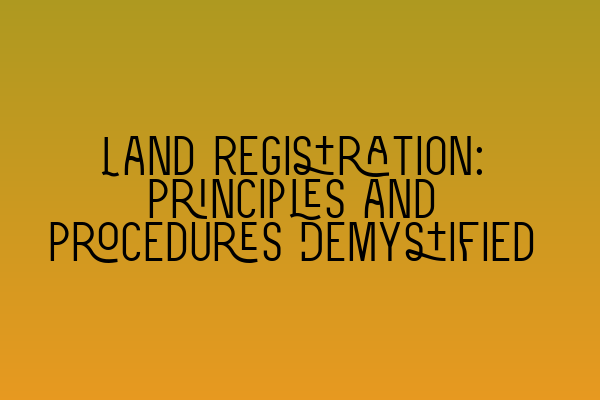Land Registration: Principles and Procedures Demystified
Welcome to SQE Property Law & Land Law, where we strive to provide you with clear and comprehensive information on all aspects of property law, including land registration. In this blog post, we will demystify the principles and procedures of land registration, ensuring that you have a solid understanding of this crucial area of law.
What is Land Registration?
Land registration is the process of officially recording the ownership and interests in land. It provides certainty and security to property owners, as well as facilitating property transactions. In the United Kingdom, land registration is governed by the Land Registration Act 2002.
Principles of Land Registration
The land registration system operates based on several key principles:
1. Indefeasibility of Title: Once your title is registered, it is considered indefeasible, meaning that it cannot be challenged except in very limited circumstances. This provides peace of mind and security for property owners.
2. Mirror Principle: The land register reflects the legal position of the property, including ownership, rights, and restrictions. It is an accurate and up-to-date record of the property’s legal status.
3. Curtain Principle: The land register operates as a “curtain” behind which all the legal information relating to the property is contained. This allows potential buyers and lenders to rely on the information in the register without having to investigate further.
Procedures of Land Registration
The land registration process typically involves the following steps:
1. Application: The first step is to make an application for registration with the Land Registry. This is usually done by the property owner, their solicitor, or a conveyancer.
2. Verification: The Land Registry will verify the application and conduct necessary searches and checks to establish the ownership and any existing interests in the land.
3. Examination: The application and supporting documents will be examined by Land Registry officials to ensure compliance with the registration requirements and to verify the information provided.
4. Registration: If the application is approved, the Land Registry will register the property and issue a title certificate, which serves as evidence of ownership and any registered interests.
It is important to note that in the case of unregistered land, the land owner must apply for first registration to bring the land into the registration system.
Benefits of Land Registration
Land registration provides several key benefits to property owners:
1. Legal Protection: Once your title is registered, you gain legal protection against adverse claims or disputes over ownership. This allows you to enjoy your property with peace of mind.
2. Marketability: Registered titles are more marketable and easier to sell or lease, as potential buyers and lenders can rely on the information contained in the register.
3. Easier Transactions: Land registration simplifies property transactions, as the ownership and interests are readily accessible in the register. This streamlines the process and reduces the risk of errors or fraud.
What if My Title Is Not Registered?
If your title is not registered, it is highly recommended that you apply for voluntary registration. This ensures that your ownership is officially recorded, providing you with the benefits and protections of a registered title.
As with any legal process, it is essential to seek professional advice from a qualified solicitor or conveyancer who specializes in land law and land registration. They can guide you through the process, ensure compliance with the registration requirements, and protect your interests.
In conclusion, land registration is a vital aspect of property law that provides certainty, security, and ease of transactions for property owners. By understanding the principles and procedures of land registration, you can confidently navigate the registration process and protect your property rights.
For further resources on SQE preparation and exam dates, please check out our related articles:
1. SQE 1 Practice Exam Questions
2. SQE 1 Practice Mocks FLK1 FLK2
3. SQE 2 Preparation Courses
4. SQE 1 Preparation Courses
5. SRA SQE Exam Dates
At SQE Property Law & Land Law, we are here to support your journey in property law and help you succeed in your legal career. Stay tuned for more informative blog posts, and feel free to reach out to us with any questions or inquiries.
